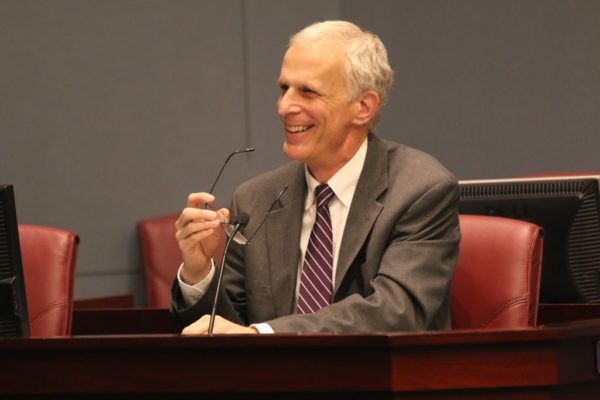(Updated at 5:15 p.m.) Amazon is moving in at a quickening clip and Arlington County’s budget-makers are breathing a sigh of relief.
After a few years of tight budgets, involving tax rate hikes and a handful of county staff layoffs, “this is a good budget year,” County Manager Mark Schwartz said today, ahead of presenting his proposed Fiscal Year 2021 budget to the Arlington County Board.
That means a lack of hard choices: under the proposal, the $1.013 per $100 property tax rate remains steady, county staff — particularly public safety personnel — are getting raises, and library fines are being eliminated.
“We’ve gone through some lean years where we’ve been challenged on the revenue side,” Schwartz told reporters. “This is a good news budget, based on the fact that… we have a revenue infusion that has allowed us to do some things we just weren’t able to do before.”
In all, the $1.4 billion budget increases spending by 2.9% and anticipates a 4.6% increase in tax revenue, thanks in part to rising property assessments and a boost in business taxes paid to the county.
The average homeowner can expect to pay an extra $376 in property taxes, even with the rate holding steady. Arlington’s tax rate is lower than that of Alexandria ($1.130), Fairfax ($1.150) and Loudoun ($1.045).
After years of budget pressures caused by increases in health costs and Metro funding, among other rising expenses amid slowly-growing revenue, Schwartz struck a decidedly upbeat tone this year. He predicted future revenue growth as Amazon continues to grow its presence and other businesses flock to the county.
“The past few years we have seen the effects of a record-high commercial vacancy rate,” Schwartz said in a statement. “Now we are beginning to see the results of our commitment to economic development and spending realignments. This budget represents an investment in the cornerstones of County government with an eye toward an innovative future in Arlington.”
“We’re coming out of the trough,” Schwartz added.
Perhaps the biggest source of budget friction this year will be with Arlington Public Schools.
Schwartz is taking pains in his presentation to emphasize that Arlington County has been increasing the percentage of tax revenue it sends to the school system, a separate governmental entity. This year, under Schwartz’s budget, APS is slated to receive $550 million, up from $500 million two years ago.
Schwartz says he expects APS, with its ever-rising student enrollment, to ask for more. But the extra $17.7 million the schools are receiving this year should be more than adequate to account for the increase in students, he said.
The budget presentation notes that APS spends $19,921 per student, according to the Washington Area Board of Education formula — the highest per-pupil cost in the region.
Other highlights from the budget include:
- An additional $9.1 million for affordable housing, including more for housing grants, rent assistance and affordable housing development.
- A 3.25-3.5% increase in pay for general county employees and an approximately 6.5% increase in pay for public safety employees (to help, in part, with police and fire department recruitment.)
- $49.3 million for Metro, a 4 percent increase from last year.
- Creating a new “traffic enforcement and control” position inside the police department, with six new full-time staffers charged with enforcing things like scooters on sidewalks and cars parked in bike lanes.
- Nine new positions in the fire department and funding for a second recruit class.
- Eliminating library fines, as part of the county’s new focus on equity. The fines disproportionally are imposed on people of color who live on the western end of Columbia Pike, Schwartz said.
- “Funding to phase in [County] Board member salary increases over a three-year period.”
- Additional funding for sidewalk, street, and streetlight maintenance.
The budget focuses “on foundational area of County government” and “shores up investments in County infrastructure and core services,” Schwartz says in his presentation.
The budget includes funding for new flood sensors, to be placed at two key intersections and in neighborhoods across the county. Schwartz noted that he is planning to propose tens of millions of dollars in stormwater infrastructure upgrades, to help mitigate flooding, in this summer’s Capital Improvement Program update. He also said the county is thinking about adjusting its stormwater tax to charge more for properties with large impervious surface areas, like parking lots.
In his budget, Schwartz proposes making Election Day in November a county holiday, at least this year, and making Presidents Day a work day instead. He also includes additional funding for more staffing and voting machines at Arlington polling stations in November.
More things included in the proposed budget:
- Enhanced county employee benefits: increasing paid parental leave from 4 to 6 weeks and increasing transit subsidies.
- $250,000 for improved tree pruning and pest management on county properties.
- $200,000 in seed funding to pilot a series of new initiatives and “nurture a more innovative culture.” Possible initiatives, which the county would try out before any wider implementation, include solar street benches and more “smart city” infrastructure near Amazon HQ2.
- A new fee for commercial properties that have more than 10 false fire alarm activations per year.
- Increased fees for “Land Disturbance Activities” in construction projects.
- Funding to facilitate the opening of the new Lubber Run Community Center and Long Bridge Park Aquatics Center.
- Modernization of some internal financial and human resource systems.
- Funding for police and sheriff’s office recruitment.
“As our financial picture brightens, we will continue to make measured and strategic investments in our community,” Schwartz said in the presentation.
As part of the annual budget process, the County Board will now hold a series of work sessions and public hearings, before a final vote on the FY 2021 on Saturday, April 18.


